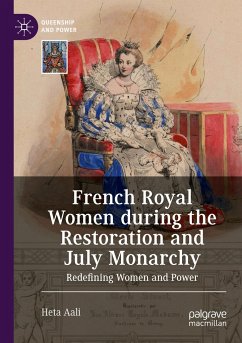
Royal Heirs and the Uses of Soft Power in Nineteenth-Century Europe
Versandkostenfrei!
Versandfertig in 6-10 Tagen
42,99 €
inkl. MwSt.

PAYBACK Punkte
21 °P sammeln!
This volume brings together a fascinating selection of studies exploring the soft power tools used by heirs to the throne in order to enhance the communication of monarchies with their audiences during the nineteenth-century. How we perceive royals and their dynasties today - as families, as celebrities, as charitable figureheads of society or as superfluous relics of a bygone age - has deep roots in the monarchical cultures of nineteenth-century Europe. By focusing on the role played by heirs to the throne, this volume offers an original perspective on the ability of monarchies to persuade sc...
This volume brings together a fascinating selection of studies exploring the soft power tools used by heirs to the throne in order to enhance the communication of monarchies with their audiences during the nineteenth-century. How we perceive royals and their dynasties today - as families, as celebrities, as charitable figureheads of society or as superfluous relics of a bygone age - has deep roots in the monarchical cultures of nineteenth-century Europe. By focusing on the role played by heirs to the throne, this volume offers an original perspective on the ability of monarchies to persuade sceptical audiences, nourish positive emotions and thereby strengthen the position of each dynasty within its respective nation. Using examples from Britain, Italy, Spain, the Netherlands, Austria, Greece, Sweden, Norway and Prussia, an international team of experts analyzes and explains the development of the very soft power tools which are still being used by Ruling Houses today.














